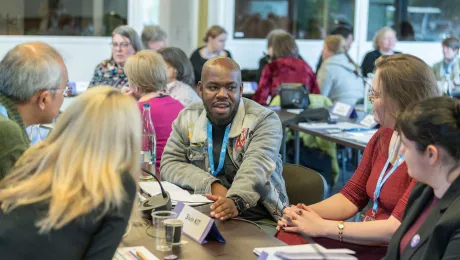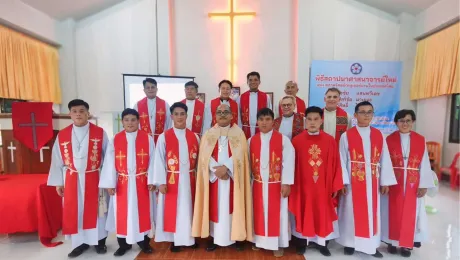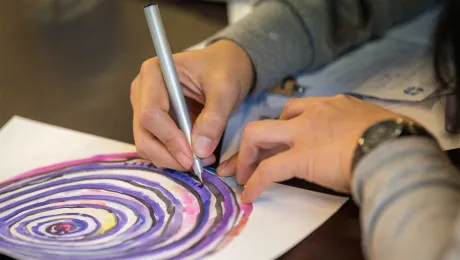
Ms Rose Bangura, Evangelical Lutheran Church in Sierra Leone, sharing about "Strengthening Gender Justice in Homes and Communities" project. Photo: LWF/ELCT Vincent Mputa
Regional workshop showcases best practices that are changing lives and perceptions
(LWI) – Church-run initiatives to take street children back to school, advocate against harmful traditional practices and address gender injustice in Africa are transforming lives, fostering strong community participation and collaboration with local stakeholders.
Diaconal practitioners at The Lutheran World Federation (LWF) regional workshop, 15-19 July, in Moshi, Tanzania, shared best practices on how such projects, often in challenging contexts, underscore the church’s crucial role in addressing social injustices and promoting transformation.
“Diakonia at the heart of community transformation: Lessons from Africa” was the theme of the workshop, hosted by the Evangelical Lutheran Church in Tanzania (ELCT). It brought together 30 coordinators —15 men, 15 women, including 7 youth—of diaconal programs of LWF member churches from the Central African Republic, Kenya, Mozambique, Namibia, Rwanda, Sierra Leone, Tanzania and Zimbabwe.

From left to right: Mr Maro Micah Maua, Rev. Titus Bere Komora (KELC); Ms Anna Nyumba, Sister Woinde Nkya (ELCT) and Mr Fred Nyamwigema (Lutheran Church of Rwanda) in a group discussion. Photo: LWF/ELCT Vincent Mputa
Ms Rose Bangura from the Evangelical Lutheran Church in Sierra Leone discussed the "Strengthening Gender Justice in Homes and Communities" project, which is aligned with the government’s national development plan on the global sustainable development goals (SDGs). Addressing gender disparity, the initiative empowers women with knowledge about their rights and responsibilities in economic development and property ownership. One of its focus areas is to improve knowledge among adolescents and teenage boys and girls on life skills and sexual reproductive health under the motto “My body, my right.”
"The project has significantly improved knowledge and attitudes toward gender roles in homes and communities, and the economic empowerment has boosted the lives of vulnerable women,” Bongura explained.
Our project stands as a testament to the church's prophetic voice and its role in sustainable development, and we are proud of the tremendous feedback and the lives we've touched.
Mr Maro Micah Maua, Kenya Evangelical Lutheran Church
Rehabilitating vulnerable children
Presenting the "Going Back to School" initiative of the Kenya Evangelical Lutheran Church (KELC), Mr Maro Micah Maua of KELC highlighted the success stories of children who have pursued higher education and now contribute to society as teachers and social workers.
Through its Pangani Lutheran Children's Center, the church rescues vulnerable children, mostly girls, from the streets of the Kenyan capital, Nairobi, with the goal to provide rehabilitation, education and transformation. “We have managed to rescue 117 girls from the streets,” noted, Maua, a 2024 LWF scholarship recipient, currently pursuing a master's degree at the University of Nairobi.
Many of the children come from vulnerable families. KELC’s continued support creates possibilities for them to go back home, emboldened to speak for themselves and advocate for their basic rights in the community. "Our project stands as a testament to the church's prophetic voice and its role in sustainable development, and we are proud of the tremendous feedback and the lives we've touched,” Maua added.

Ms Mary Mmbaga presenting ELCT’s initiative of combating the harmful cultural practice of female genital mutilation. Photo: LWF/ELCT Vincent Mputa
FGM community champions
Ms Mary Mmbaga shared ELCT’s initiative of combating the harmful cultural practice of female genital mutilation (FGM) and gender-based violence (GBV), a project that has reached over 3,200 girls across three dioceses. By engaging village elders, women and faith leaders, the church has trained hundreds of so-called “community champions” to trace and report FGM practices.
She explained the challenging context against which FGM still occurs in many communities across Tanzania, despite efforts by churches, the government and other actors. “For those who undergo FGM, it is a traditional celebration. Thus, it is not easy going into the community to tell them to stop, it is a process, and we need more actors and funds so that we can continue to bring awareness,” she noted.
Mmbaga also emphasized the importance of integrating FGM and GBV issues into church curricula and including peace-building components for a holistic approach. “Our project has had significant impact and sustaining its progress and funding remains essential,” she noted. “When we address FGM, we must talk about a safe space for a girl child,” she added.
Ms Linda Chikerema, Evangelical Lutheran Church in Namibia, introduced the “Pathways to Equality” initiative, which is centered around empowering the San community by integrating indigenous methodologies. It incorporates institutional unlearning and relearning of attitudes toward the San community and creating a community healing process. Designed collaboratively with the community, the initiative underscores the importance of preserving cultural heritage, promoting social justice, and upholding human rights.
A diaconal church
Meeting in Moshi provided an opportunity to hear from the ELCT Northern Diocese Bishop Dr Fredrick Onaeli Shoo, who also delivered greetings from the Presiding Bishop Dr Alex Gehaz Malasusa. Shoo encouraged the workshop participants “to seek a common path for transformation, reconciliation and building righteous communities” and “discover new ideas and practices for a diaconal church in the African context.”

From left to right: Ms Phiona Uwase (Lutheran Church of Rwanda), Mr Aoudou Michael (Evangelical Lutheran Church of the Central African Republic), Mr Antonio Lembranca (Evangelical Lutheran Church in Mozambique) and Ms Pendo Mahoo (ELCT) sharing their experiences. Photo: Photo: LWF/ELCT Vincent Mputa
The workshop was facilitated by the LWF Program Executive for Diakonia Mr Ashenafi Haile and the Program Executive for Member Church Projects Ms Rebekka Meissner, with support from Rev. Dr Samuel Dawai, Regional Secretary for Africa. Participants also reflected on biblical foundations of diakonia and advocacy for peace and gender justice.
It concluded with visits to six institutions of the ELCT Building a Caring Community (BCC) centers for children and young adults living with disabilities. Established in 2007, BCC operates in eight parishes in Moshi, delivering comprehensive services to individuals and their families. It extends support to over 200 children and youth through both center-based and home-based programs.


